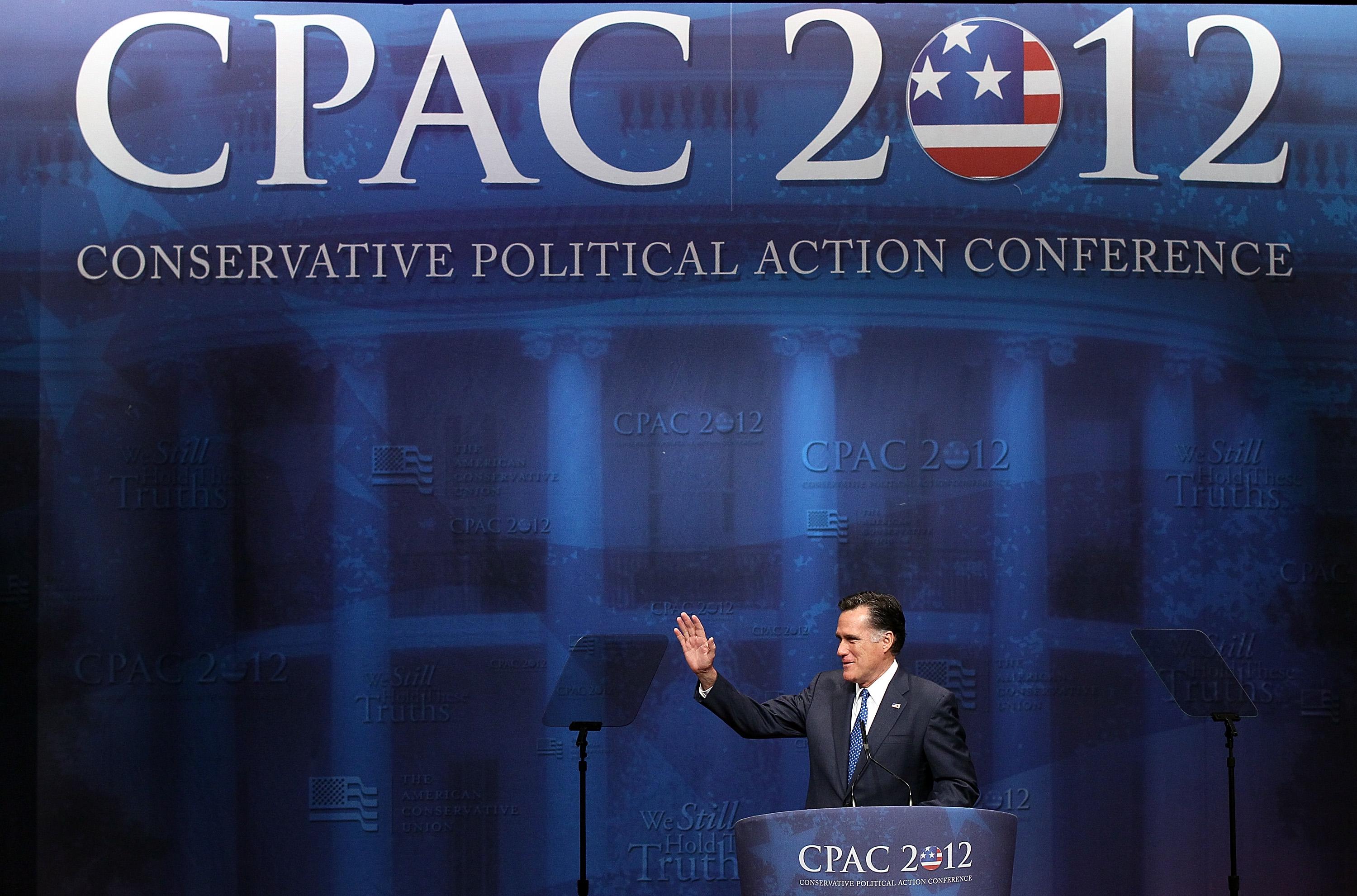For the next few days, barring another big, Pope-level news break, this blog will transmogrify into a diary of CPAC. It’s only fair that I answer some questions about that.
What is CPAC?
The Conservative Political Action Conference.
What is the Conservative Political Action Conference?
Oh, this is going to be one of those FAQs. Held every spring since 1973, it’s a non-profit gathering of conservative/libertarian activists and (almost exclusively) Republican elected officials. It’s run by the American Conservative Union Foundation, which largely exists to make this happen, and to issue press releases, and to sign on to press releases. Held for 10 years in D.C., it’s moving to the semi-isolated beltway resort at National Harbor. This will deny reporters one of the favored CPAC cliches—teeming youngsters with bad suits and badges and Reagan ‘80 buttons climbing off the Woodley Park Metro stop.
Who’s invited?
Almost everybody with a ticket fee, a press pass, or an elected office. The slogan this year is “America’s Future: The Next Generation of Conservatives,” but few of the marquee speakers are first-timers. They include Kentucky Sen. Rand Paul (who spoke here when his father was running for president), Wisconsin Rep. Paul Ryan (who has always used this event to talk up his budgets), NRA CEO Wayne LaPierre (who used to give the same audio-visual presentation every year, but has new material ever since Newtown), former Fox News pundit Sarah Palin, and defeated 2012 presidential candidate Mitt Romney. More than 10,000 activists are expected to show up, all of them becoming instant experts and pundits for hundreds of reporters, whether they like it or not.
Who’s not invited?
Not that many people, but they’ve immediately become famous. GOProud, a gay Republican advocacy group, has been barred from co-sponsoring CPAC since it did so in 2011 and pissed off social conservatives. (Chris Barron, one of the group’s founders, called CPAC board member Cleta Mitchell a “nasty little bigot” in an interview with the gay magazine Metro Weekly. His apology was not truly accepted.) Social conservative groups like the Family Research Council staged a boycott of the event that year. The boycott succeeded, aided when the ACU’s new chairman Al Cardenas took the reins. Anti-Sharia law campaigner Frank Gaffney has been barred since that year, too, in no small part because he used his platform at the conference to attack Grover Norquist and Suhail Khan, both advocates for bringing Muslims into the movement. Pamela Geller, a blogger who won real fame for opposing the “Ground Zero Mosque” in New York, has been barred after being relegated to rented rooms far from the main stage. New Jersey Gov. Chris Christie and Virginia Gov. Bob McDonnell were not invited, and Cardenas told National Journal that the former was left of the list because he didn’t have an “all star” year.
Seriously? That’s crazy.
Some people think so. McDonnell’s possible Republican successor, Virginia Attorney Ken Cuccinelli, is kicking off the conference anyway. It’s a “conservative” conference, not a Republican conference. Ronald Reagan appeared at the first one, but Nelson Rockefeller didn’t. For whatever reason, this shocks people.
Fine, sure, but how does that lead to Mitt Romney getting an invite?
Romney’s actually a fascinating case. In 2007, he arrived at CPAC as the electable, conservative alternative to frontrunners like John McCain and Rudy Giuliani. His campaign spent real money to bus people in and win a straw poll. In 2008, Romney announced that he was quitting the race from the CPAC stage. (This was right after Super Tuesday, minutes after Laura Ingraham told the crowd to get behind Romney.) In 2011, he returned as the moderate candidate for president, despite having changed nothing in his platform. If anything, he’d moved right, but his Massachusetts health care mandate had become the basis for an Obama achievement that now defined Republican opposition. In 2012, as he was winning the nomination, he ad-libbed that he had been a “severely conservative governor,” and everyone mocked him. In 2013, according to Cardenas, “the thousands gathered at CPAC this year are eager to hear from the 2012 GOP presidential candidate at his first public appearance since the elections.”
I don’t follow.
Nobody does. That’s what makes this CPAC interesting: Instead of being defined by support for George W. Bush or excitement over new presidential candidates or opposition to Barack Obama, it’s starting with angst about an unexpectedly lost election and real divisions over what the GOP can stand for.
And what else?
The conservative media, which always finds a wide spotlight at CPAC, is running some experiments. Andrew Breitbart’s network of reporters and filmmakers and friends is all over the conference: Steve Bannon, who directed the Sarah Palin documentary The Undefeated, now runs the Breitbart network and has three films at the conference. Citizens United, the group that brought you modern campaign finance law, is holding a Breitbart remembrance. The Breitbart crew is holding an exclusive party off-campus, rivaled in buzz only by the BlogBash party co-sponsored by the National Republican Senatorial Committee and threatened by left-wing hackers.
Wait, left-wing hackers?
That’s another story.
